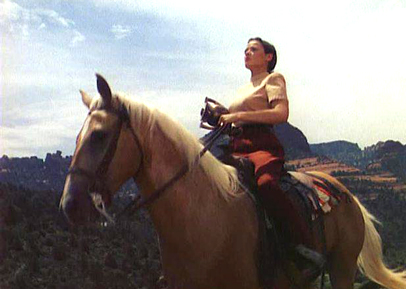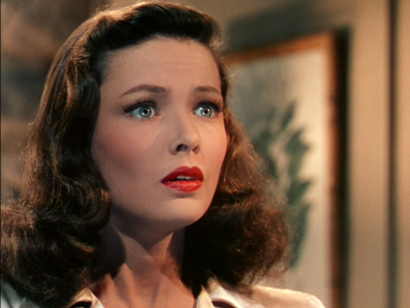
 |
|
|
|
It must be a Hollywood law: critics must first mention that Leave Her to Heaven is a film noir that breaks the cardinal rule of the style by being filmed in gleaming oversaturated Technicolor. Its claim to fame is an audacious storyline that would only be allowed by the Production Code in the wake of Double Indemnity, the film that finally broke the dam vis-a-vis the portrayal of sordid crime activity on movie screens. Presented with picture-postcard visuals and a high technical polish, the Ben Ames Williams potboiler is about a deeply disturbed but outwardly charming woman, who commits some particularly heinous crimes. 
Only three years earlier, Alfred Hitchcock had wanted his domestic thriller Suspicion to end with a cold-blooded murder followed by an ironic revenge from beyond the grave. That idea was considered too morbid for multiple reasons. In this picture, a psychotic wife cannot restrain her homicidal urges. She kills two competitors for her husband's attention, and then plots to ruin his life even after she's gone. Several years later Otto Preminger's annihilating melodrama Angel Face employed at least some ambiguity to portray a similar "can't help it" domestic killer. Gene Tierney's Ellen Berent is simply a serene beauty with a father complex and a homicidal disposition. A good joke title might be The Revenge of Laura. The story takes place in the Technicolor-friendly wealthy, beautiful and talented class. Author Richard Harland (Cornel Wilde) meets the beautiful Ellen Berent (Gene Tierney) on a train and is smitten by both her and her interesting family, especially her half-sister Ruth (Jeanne Crain). Ellen's controlled exterior masks a strange inner turmoil. She seemingly falls in love with Richard because he resembles her beloved dead father. Spoiled in all things, Ellen maneuvers Richard into a quick marriage. All goes well until she must share Richard's attention with his invalid kid brother Danny (Darryl Hickman). In fact, Ellen becomes pathologically aroused whenever her exclusive control over Richard is threatened by outsiders, even members of her own family. Nobody realizes how severe Ellen's condition is, until... In film school Leave Her to Heaven seemed both daring and subversive for 1945. A gorgeous beauty queen, poised and gracious, is actually a mad killer that decimates her well-to-do American family from the inside out. John Stahl made his name in the 1930s as a director of enormously popular women's pictures. Perhaps the most beautiful screen couple of their time, neither Gene Tierney nor Cornel Wilde were noted for a wide acting range. Given strong support by Stahl's direction, both rise to the occasion. Audiences hip to the topical interest in psychology were fascinated by Ellen Berent's manipulative relationship with her trophy husband, and her inability to love except on the most selfish terms. 
Audiences also identify with the story because at basic it's about typical communications problems in marriage. Ellen Berent never divulges her real feelings to anyone, and unnecessarily tricks handsome Richard into a hasty marriage proposal, apparently just to slam the door on her unfortunate ex-fiancé (Vincent Price, in hurt/perturbed mode). Ms. Tierney is appropriate casting in that Ellen wears her beauty as a mask, never admitting her true feelings even to her sister Ruth. On the other hand, Cornel Wilde must play Richard Harland as particularly dense and uncomprehending. Almost like Kent Smith in Cat People, Richard is doltishly insensitive to Ellen's inner disturbances, even when she drops huge clues in his path that she's unhappy. Richard assumes that Ellen will naturally take on the role of co-caretaker for Danny. Later on, when Ellen might as well be wearing a sign reading "Black Widow", Richard remains oblivious to Ellen's needs. She's demanding, but she does have legitimate needs - time alone, a real honeymoon, maybe. When it comes down to it, hubby is clueless and Ellen is incapable of communicating her feelings directly. Even though it's obvious that Richard would take any of her desires seriously, she can't put a sentence together that says something like, "We're just married, I'm sick of sharing you with other people all the time, and this is important." So Leave Her to Heaven is quickly set up for what at the time must have been some hair-raising murder scenes (no spoilers here), especially from a writer (Jo Swerling) that once specialized in lighthearted Frank Capra movies. Swerling's script retains the psychological framework of Ben Ames Williams' novel. Ellen was obsessed with her father and sees in Richard the perfect mate because of his physical resemblance to him. Everything follows from there, with little development. Ellen is eventually dismissed simply as "one of those monsters who...", the same words used to describe the evil small-town doctor in Kings Row. Luckily for Richard, Ellen has a wholesome and healthy younger sister Ruth waiting in the wings. She's played by Jeanne Crain as the real answer to what a man needs instead of the glamour dream he wants. Ellen deals in abstractions and power plays, cleverly using her grim fiancée Vincent Price to force an engagement with Richard. Ruth is always seen tending gardens, growing things and mending clothing. She's an Earth spirit to Ellen's harpy, get it? Leave Her to Heaven is awash in production values and swanky settings. Ellen's family is headquartered in some beautiful New Mexico scenery (Sedona, Arizona?) and Richard's hideaway lodge is on the shore of a Maine lake and only accessible by canoe. We expect the beautiful clothes worn by Ellen to be impressive but the Technicolor sheen makes everything on screen seem to drip money, even the old "woodie" station wagons that glow in waxed browns and greens. Leon Shamroy's camera gives the film the surreal look of a too-perfect magazine layout of the day. It's not a particularly noir look -- there are few shadows in the film -- but it is arresting. John Alton would successfully create a more appropriate Technicolor noir look ten years later in the underachieving but great-looking Slightly Scarlet. 
That brings us to Alfred Newman's interesting score and the film's oft-cited funeral on horseback. Newman's main theme is an ominous and pallid clarion call, a series of dynamic notes that play off a heavy funereal beat. It segues into a short passage that sounds like classical opera, and then pays off in more downbeat notes, like a doom-laden dirge. It almost resembles something Bernard Herrmann would do, even though he'd orchestrate it differently. The music gets our attention over the Fox logo and is given a full workout in an early scene set at dawn atop a mountain. Like a ritual from a Greek tragedy, Ellen rides up and down the crest of a trail atop a beautiful horse, distributing the ashes of her dead father. Leave Her to Heaven doesn't go in for dynamic angles but the music lends a weird, operatic grandeur to the wordless proceedings. With Sedona looking like some fantastic other world, it's a prime example of a "music and landscape" tour-de-force such as can be found in movies like Garden of Evil, The Big Country, and First Men In the Moon. The Twilight Time Blu-ray of Leave Her to Heaven showcases a superb digital restoration of this 3-Strip Technicolor film. I've seen original IB Tech prints and can say with enthusiasm that the disc makes Heaven look as good, if not better. In 1945 Technicolor still had a slightly unreal intensity to its hues, with warm face tones and (at 20th Fox) strong blues and greens. What would prove the perfect medium for candy-colored musicals sometimes seemed a bit much for ordinary narrative pictures, but seems entirely appropriate for this hyper-intense morbid soap opera. Tierney and Wilde, probably buried in makeup and carefully lit in close-ups, look amazing. The older DVD only hinted at the film's original look but this Blu-ray nails it. Forget what you've seen on TCM, even in recent cablecasts -- I took a look a day or two ago and what they're showing does not appear to be the new restoration. The audio track is free of distortion, including the movie's impressive music score, which is auditable on the disc's Isolated Music Score Track. The new disc repeats most of the extras from the old DVD. Richard Shickel shares a commentary track with Darryl Hickman. Shickel must care about the movie as he analyzes it from every angle he can think of. Hickman goes through his career as a child actor in complete detail. It's quite an interesting story, especially when he's describing how Elizabeth Taylor at the age of fourteen changed seemingly overnight from a little kid to a sexualized woman (he's polite and respectful). We also get a newsreel and an original trailer. Considering all the phony psychiatry floating around in movie thrillers of the 1940s, this show is fairly sophisticated. With some great Hollywood stories to tell and interesting angles to pursue, insert pamphlet liner note essayist Julie Kirgo provides an introduction to Leave Her to Heaven that is both informative and thought-provoking. Average viewers will find Kirgo far more welcoming than the relatively arcane text quote from Time Out Film Guide, which reads, "... very Japanese in effect, like an acidic fusion of Ozu and Naruse." I usually find that Ozu and Naruse tastes better with a twist of lime.
On a scale of Excellent, Good, Fair, and Poor,
Leave Her to Heaven Blu-ray rates:
Reviews on the Savant main site have additional credits information and are often updated and annotated with reader input and graphics. Also, don't forget the 2011 Savant Wish List. T'was Ever Thus.
Review Staff | About DVD Talk | Newsletter Subscribe | Join DVD Talk Forum |
| ||||||||||||||||||